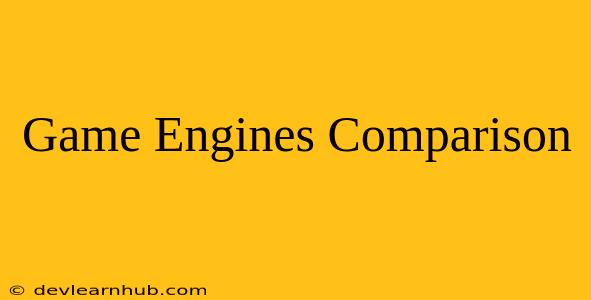Game Engines Comparison: Choosing the Right Tool for Your Project
The world of game development is vast, with countless tools available to bring your ideas to life. One of the most crucial decisions you'll face is choosing the right game engine.
Game engines are the foundation of your game, providing the framework for everything from graphics rendering and physics to audio and scripting. With so many options available, it can be overwhelming to choose the best engine for your needs. This article will delve into some of the most popular game engines, comparing their strengths and weaknesses to help you make an informed decision.
Factors to Consider When Choosing a Game Engine
Before we dive into specific engines, let's first consider the key factors that influence your choice:
- Target Platform: Are you developing for PC, mobile, consoles, or all of the above? Some engines are better suited for specific platforms than others.
- Genre: Different engines excel in different genres. For example, a 2D platformer might benefit from a lightweight engine like Godot, while a complex AAA title could require the power of Unreal Engine.
- Experience Level: Some engines are more beginner-friendly than others. If you're new to game development, consider engines like Unity or Godot.
- Budget: Licensing costs and the need for specialized plugins can impact your budget.
- Community Support: A strong community provides valuable resources, tutorials, and support.
Popular Game Engines and Their Key Features
Here's a comparison of some of the most popular game engines:
1. Unity
- Strengths:
- Powerful and versatile, suitable for a wide range of genres.
- Large and active community with ample resources.
- Beginner-friendly interface and extensive documentation.
- Cross-platform support for PC, mobile, consoles, and web.
- Weaknesses:
- Can be resource-intensive for complex games.
- Some users find the engine's interface cluttered.
2. Unreal Engine
- Strengths:
- Cutting-edge graphics technology, renowned for its visual fidelity.
- Powerful blueprint system for visual scripting.
- Robust and scalable, suitable for large-scale projects.
- Strong focus on AAA development.
- Weaknesses:
- Steep learning curve, especially for beginners.
- Can be resource-intensive.
- Less flexible for indie projects compared to Unity.
3. Godot
- Strengths:
- Open-source and completely free.
- Beginner-friendly and intuitive interface.
- Powerful built-in features like physics, 2D/3D support, and scripting.
- Growing community and increasing popularity.
- Weaknesses:
- Limited support for advanced features like AI and complex shaders.
- Smaller community compared to Unity and Unreal Engine.
4. GameMaker Studio 2
- Strengths:
- Designed specifically for 2D games.
- Easy to use and learn, even for beginners.
- Drag-and-drop functionality for faster development.
- Supports a wide range of platforms.
- Weaknesses:
- Limited 3D support.
- Less powerful compared to Unity and Unreal Engine.
5. CryEngine
- Strengths:
- Highly customizable and powerful engine.
- Excellent graphics and physics capabilities.
- Suitable for large-scale and open-world games.
- Weaknesses:
- Steep learning curve.
- Complex to set up and configure.
- Smaller community compared to other engines.
Conclusion
The best game engine for you depends entirely on your specific needs and project requirements. Consider the factors mentioned above, research different engines thoroughly, and choose the one that best aligns with your goals.
Remember, there is no one "best" engine, only the engine that is the best fit for your project. Don't be afraid to experiment with different engines and see which one you enjoy working with the most. Happy developing!
